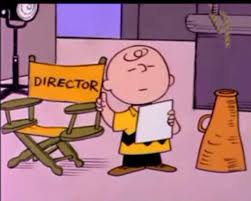 I have been asked to contribute my checklist for directing plays to the 11th edition of Stage Management. Here it is.
I have been asked to contribute my checklist for directing plays to the 11th edition of Stage Management. Here it is.By the way, three weekends remain in the run of the wonderful play I'm directing, Neil Simon's Broadway Bound at Chanticleers Theatre, in Castro Valley, CA. I also play 1940s and ragtime songs on the piano during the half hour before the show. Tickets are at www.chanticleers.org.
The Checklist I Use in Directing a Play
Of course, I'd vary these, depending on the theatre, play, cast and crew, etc.
A year before opening
Pick the play YOU want to direct. Find a theatre company willing to let you direct it.
Cast a wide net to recruit the best possible cast and crew. Good people are hard to find--especially in community theatre, where cast and crew usually are paid little or nothing. Of course, consider people you've successfully worked with before.
Four months out
Read the script a number of times.
Meet with the set designer. Discuss opportunities and limitations of the space. Have a ground plan ready for the first production meeting
Purchase a script for each cast member (usually required in the playwright's licensing agreement.) Then scan the script into an editable Microsoft Word file and add your draft blocking and business. (Use the ground plan and chess pieces to help you envision it.)
Three months out
Hold your first production meeting. Present your artistic vision to your set, costume, lighting, and sound designers, and prop master. Solicit the theatre's artistic director's input. Invite crew to auditions.
Hold auditions. Distribute a draft rehearsal and show schedule (including any possible extra midweek fundraising performance dates) and have auditioners note all conflicts. Make casting decisions both on acting ability and how easy the actor is to work with, whether s/he is likely to contribute to or detract from esprit de corps. Before casting someone, call directors they've acted for.
Consider inviting or even requiring casted actors to get offbook by the first rehearsal. Their having received the scripts with the first-draft blocking should make that easier. Requiring them to get offbook fast enables the rehearsals to focus on creating great theatre, not memorizing lines. Most actors will still need some line calling but it will be minimized.
Email the tentative schedule, of course, taking into account all actor, stage manager, and director conflicts.
Two months out
Meet with your public relations person. Identify angles and copy to use in pitches to patrons and the media.
Meet with your group sales person. These are often critical to filling houses. That person may also pitch organizations buying out the house for a special midweek performance. Include offering organizations serving low-income people free tickets to the preview performance.
Write copy for the website, show program, third-party ticket sellers, etc. Get it approved by the PR person.
Six weeks out
Hold first rehearsal. (You may wish to start earlier, especially if it's a musical.) Establish your rules. Mine are rehearsals start on time, the schedule is subject to change, input is welcome, the draft blocking is cast not in stone but jello, most notes are communicated by email, and unless an actor objects, I may send actors notes during the run. Rather than having them do an in-the-chair readthrough, I have them read while walking the draft blocking. After that first rehearsal, have a bonding party.
As soon as possible, get the cast solid on lines, blocking, and business.
Retain a videographer to make a trailer and -if the script licensing agreement allows--to record a performance for the theatre's archive and-for the cast and crew to have as a souvenir.
Four to five weeks out
Work the scenes. Each rehearsal focuses on two or three five-to-ten-minute chunks (usually French scenes,) each usually worked three times. Catch them doing something good: When I see something I like, without stopping them, I say "Good" or "Keep it." If it's something I don't like and I can say it in a pleasant word or two, I may do so but most notes are communicated by email when I get home from rehearsal.
As needed, coach actors one-on-one. If it's an actor who needs a lot of work, I often invite them to my home for coffee and homemade scones before we work. That sets the stage for a pleasant, constructive coaching session.
Meet again with production staff to get progress reports and provide feedback. Meet with the set builder to gain final agreement on the plan and reaffirm the deadline for the completed set.
Meet with prop master to decide on how to decorate the lobby. Get headshots from actors to hang in the lobby.
Two to three weeks out
Dress the set. (furniture, walls, floors)
Costume parade, publicity photo shoot, trailer shoot.
Post trailer on the theatre's site, third-party ticket seller sites, Facebook, YouTube, and Twitter.
Introduce and revise props, ensuring their efficient placement.
Run acts and then the full play. Focus on acting and pacing issues.
One week out
Cue-to-cue with sound and light operator.
Tech Saturday or Sunday: Full runthrough with tech, no stopping if possible. Give notes. Take a pizza/salad break, then another full runthrough with tech, no stopping if possible. (Costumes may be optional if not necessary for lighting adjustments.)
Dress rehearsals.
Preview performance.
Opening night.
The 2nd-to-last performance
Record the performance to create the archival DVD.
Final performance
Cast/crew strike party.
Dr. Nemko is a director and President of the Board of Chanticleers Theatre, Castro Valley, CA. www.chanticleers.org.













